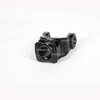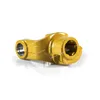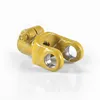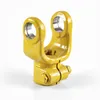A Splined yoke is a crucial component in mechanical power transmission systems, designed to connect rotating shafts while allowing for axial movement and torque transfer. These yokes feature internal or external splines that interlock with corresponding splines on shafts or other components, ensuring a secure and efficient connection. Commonly used in automotive, industrial machinery, and aerospace applications, splined yokes provide reliability and durability under high-stress conditions. In this article, we delve into the specifics of our splined yoke products, covering detailed parameters, FAQs, and more to help you make an informed decision.
Our splined yokes are engineered with precision to meet the highest industry standards. They offer excellent resistance to wear and corrosion, thanks to advanced materials and coatings. Key features include high torque capacity, minimal backlash, and compatibility with various shaft types. Whether for heavy-duty machinery or precision instruments, our yokes ensure smooth operation and long service life.
Below, we provide a comprehensive overview of the parameters for our splined yoke models. These details are essential for selecting the right component for your application.
| Model Number | Spline Type | Inner Diameter (mm) | Outer Diameter (mm) | Length (mm) | Torque Capacity (Nm) |
|---|---|---|---|---|---|
| SY-101 | Involute Spline | 20 | 40 | 50 | 200 |
| SY-102 | Straight Spline | 25 | 45 | 60 | 300 |
| SY-103 | Involute Spline | 30 | 50 | 70 | 400 |
| SY-104 | Straight Spline | 35 | 55 | 80 | 500 |
Splined yokes are versatile and used across various industries. In automotive systems, they connect driveshafts to transmissions, enabling smooth power delivery. Industrial machinery relies on them for conveyor systems, pumps, and gearboxes. Aerospace applications include actuator systems and rotor assemblies. Their ability to handle misalignment and axial movement makes them ideal for dynamic environments.
Here are some common questions about splined yokes, answered in detail to address your concerns.
What is a splined yoke used for?
A splined yoke is used to connect rotating shafts in mechanical systems, allowing for torque transmission and axial movement. It is commonly found in automotive drivetrains, industrial equipment, and aerospace mechanisms where reliable power transfer is essential.
How do I choose the right splined yoke for my application?
Selecting the right splined yoke involves considering factors such as torque requirements, shaft dimensions, material compatibility, and environmental conditions. Refer to the product parameters table above and consult with our technical team for personalized recommendations based on your specific needs.
What materials are splined yokes made from?
Splined yokes are typically made from high-strength materials like alloy steel for heavy-duty applications, stainless steel for corrosion resistance, or aluminum for lightweight needs. The choice depends on the operating environment and performance demands.
Can splined yokes be customized?
Yes, we offer customization options for splined yokes, including specific dimensions, spline types, and surface treatments. Provide your requirements, and our engineering team will work with you to develop a solution that fits your application perfectly.
How do I maintain a splined yoke?
Regular maintenance includes inspection for wear, lubrication of splines to reduce friction, and checking for proper alignment. Avoid overloading and operate within specified temperature ranges to extend the yoke's lifespan. Replace the yoke if significant wear or damage is detected.
What is the difference between involute and straight splines?
Involute splines have curved teeth that provide smoother engagement and higher torque capacity, making them suitable for high-precision applications. Straight splines have linear teeth and are easier to manufacture, often used in less critical systems. The choice depends on the required performance and cost considerations.
Are splined yokes compatible with all shaft types?
Splined yokes are designed to match specific shaft splines. Ensure that the yoke's spline type (e.g., involute or straight), diameter, and number of teeth match the shaft. Incompatible pairings can lead to failure, so always verify specifications before installation.
What are the signs of a failing splined yoke?
Common signs include unusual noises (e.g., grinding or clicking), vibration during operation, difficulty in engaging or disengaging, and visible wear or corrosion on the splines. Address these issues promptly to prevent system downtime or damage.
How long does a splined yoke typically last?
The lifespan varies based on usage, maintenance, and environmental factors. Under normal conditions with proper care, a splined yoke can last several years. High-stress applications may require more frequent inspections and replacements.
Do you provide installation guides for splined yokes?
Yes, we offer detailed installation guides that cover steps such as aligning the yoke with the shaft, applying appropriate lubrication, and torqueing fasteners to specified values. These guides ensure correct installation for optimal performance and safety.






